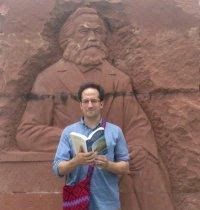I am sitting in a chair of burnished steel looking at a black and white photograph of Paris. I am drinking tea while soft music full of uplifting major chords plays in the background. I have sat in many similar cafes with black and white photos of Paris. The last one was in Guatemala, in Santa Cruz de Quiche where I ate granola. It was the Maya heart of Central America, but the town was named for a religion brought five centuries ago from Andalucia. This cafe is in the Cantonese part of China, in a City called Foshan. This is a Chinese word, but it means Mountain of Buddha, named for a foreign religion brought eighteen centuries ago by missionaries from India.
My first week here, I went for a health check up. Doctors in white coats sitting behind grey desks looked at clipboards, had me close one eye and observe E's in various positions on a wall chart, tapped my knee, and gave me a plastic specimen cup. Everything seemed very familiar in all respects except the language. The words out of their mouth and the things written on the clipboard were Chinese, which I hardly understand. But the objects and the motions were almost instantly recognizable.
The writing is the obvious marker here. Western Europe, the Americas, and Australia all use the alphabet developed 20 centuries ago by the Roman Empire. The regular lines and curves of the letters are visible here as well—all the city trash cans are labeled in English and Chinese, as are many bus stops. But while not difficult to find, the English letters are smaller, and uncommon. Stores, soft drinks, and ingredients are labeled in the older writing system developed even earlier here in China.
I am trying to teach students here at Foshan University to speak English—which they do. Of course, to make their words, they often string together the sounds they are familiar with from Chinese. This is why their diction seems imprecise on words like "because" or "work". Like anyone speaking a new language, their first instinct is to build the new words out of the sounds they are already familiar with. When I try to describe my surroundings, I also string together images familiar with from other places I have been. So perhaps my attempts to reproduce and describe what I see are a little distorted by the accent of my previous cultural environments, an accent I hope I will lose.
Foshan is a very large town, 2 million people: larger than any city in Central America, but it is only a suburb of Guangzhou. The area I live in is on the edge of downtown, full of skyscrapers, and wide boulevards traveled by cars, motorcycles, bicycles. Children shop for clothes and ipods in fashionable boutiques conducting themselves much like Southern California kids in malls. But not everything has been brought over. Among the kids browsing the endless malls, there are no skateboarders or long-haired hippies. I bought a guitar at a music store featuring large black flags with Anarchy symbols and pictures of Che Guevara, but everyone working there looked clean-cut and semi-preppy. Occasionally I see beggars, often with very visible disabilities. And I am sure there are parts of town where people ar every unhappy. Much of Western culture has been imported, but in Foshan at least, one significant part of Western culture has not been imported: the Western sub-culture of Rebellion against the mainstream: there are none of the signs of middle class angst in urban zones, or working class gang-membership I saw in Guatemala. In High School when we went to pep rallies—I was always a little uncomfortable. And in college I met people who actively made fun of them. But here in China, everyone seems like the type ready to cheer for the home team, despite how similar the hallways and lockers and class schedules seem.
Sunday, 11 November 2007
Subscribe to:
Comments (Atom)

